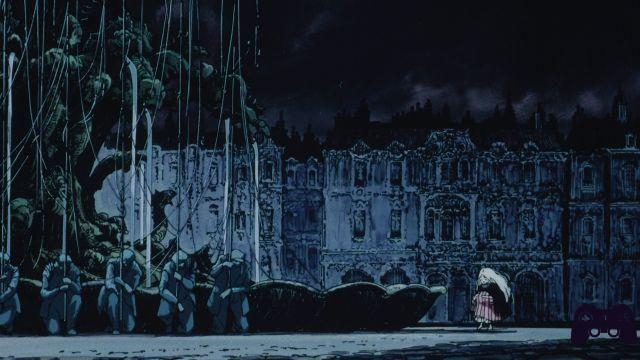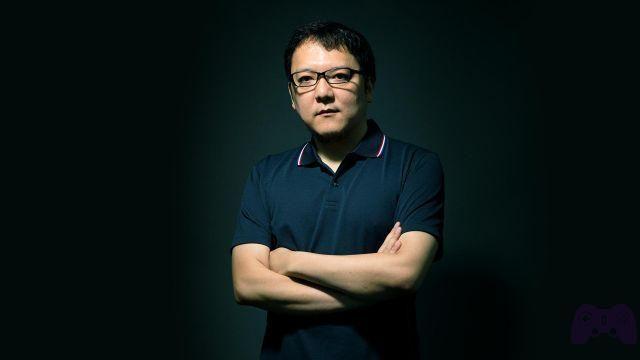
Understanding Death Stranding: Mamoru Oshii, Andrej Tarkovskij, the loneliness of man and the adversity of nature.
Death Stranding highlights a profound relationship between video games and faith.
It does so by taking up the aesthetics, metaphors and messages of two very important authors: Andrej Tarkovskij and Mamoru Oshii.
Also in this case the assist comes directly from Kojima's social networks, who often made clear references to the cinema of both.
Faith and video games then come into contact once again, after they had already done it in their own way, among others, the work of Fumito Ueda and Horizon Zero Dawn.
The beach of the dead. In Death Stranding the beach is the place of death. Exactly like in Tarkovsky's The Childhood of Ivan.

It is curious how three types of authors come into contact so different. On the one hand there is Tarkovskij, one of the greatest directors of the last century, capable of leaving an indelible imprint on European and world cinema forever, on the other there is Oshii, known for his seminal influence in animated cinema Japanese. The meeting point between two so distant cultures of work and art is Kojima himself, who as a passionate cinephile as he has always defined himself he was able to rework the vision of both and make it his own.
Andrej Tarkovskij: the loneliness of man and the revolt of nature.
Playing Sam Porter Bridges in Death Stranding I got the feeling of being a star playing a highly gamified version of an Andrei Tarkovsky movie. The first parallel that jumped my eye is definitely the one with Stalker. In the film we witness the journey of three people inside the "Zone", an area in which, following the fall of a meteorite, the laws of physics and nature have been subverted. In Kojima's work, the United States has been transformed into the Zone. Inexplicable physical and atmospheric phenomena hit a world that seems to have lost its natural characteristics.
Nature, in both works, has turned to man, has become hostile.
In both cases, man is condemned to the difficult search for the meaning of what is happening around him. God is not spoken of in any way.
Thinking about it, both the image of a world in which the very concept of space is distorted, and that of a world in which the simple contact with creatures of unknown origin can trigger the extinction of the human race are among the most terrifying. never conceived.
[…] I like to talk about the problems of the absolute in a philosophical sense, I am passionate about it, but it is difficult for me to talk about God because he is silent with me, and I am not the first to affirm it. I think that only art can know and define the absolute.
Andrei TarkovskyBoth Kojima and Tarkovskij recounted the solitude of man on earth and the resulting disillusionment. Two perfect examples of how faith and cinema in one case, and faith and video games in the other can establish a dialogue.
Both Tarkovsky and Kojima tried to tell us how insignificant we are on this planet.
Exile
What may have prompted Kojima to seek connections with Tarkovsky's production? One of the many possible answers is that both, in their careers, they had to deal with exile.
The Russian filmmaker faced a great variety of pressures and censure by the Soviet Communist Party, which stopped him from working for some years and refused to export his works beyond national borders. The parallel with Hideo Kojima is glaring, since he is also the dad of sagas historical like Metal Gear Solid and Zone of the Enders was forced into silence by Konami, which in 2015 had taken the form of a totalitarian regime.
For a creative, both the imposition of silence and the inability to work are among the worst things that can exist. Put a gag on who for nature - before work - is led to create and convey messages is an act coward. Censoring an author, moreover of the caliber of Tarkovskij or Kojima, is one of the worst things that can be done to culture as a whole, just as it is to take sides against it regardless.
Mamoru Oshii: the death of the world, of man and of God.
Religion in Evangelion Also in the work of Hideaki Anno great importance is given to the concept of faith. It is no coincidence that it is one of the main inspirations of Hideo Kojima's latest effort.
The egg of the angel it is the most complex and cryptic work of the master Mamoru Oshii. It tells the story of a girl in possession of an egg, in which she is convinced the key to the salvation of the world is hidden, and of a soldier who, driven by curiosity to find out what is inside it, he wants to break the shell. Oshii's work is a great metaphor of faith and its loss, in which the theme of loneliness, travel and the illusion of reality converge. For Oshii, that film was the natural response to the loss of faith, as he himself stated several times; It is in this feeling that the most intimate soul of the work resides.
If from a certain point of view the image of the protagonist of the film who wanders the world with her egg recalls Sam who crosses america with his BB always connected to the suit, the contact points are actually many more.
As we mentioned above, in Death Stranding there is no God. He is never mentioned or brought up on any occasion; the world situation is so tragic that it seems impossible to theorize the existence of a benevolent God.
The faith of men, particularly that of Die-Hardman, Higgs and Sam, is placed in Amelie. All the kilometers we travel, the packages we load on our shoulders and the risks we run around the wastelands of america are the manifestation of our faith in her, who, however, will prove to be such and like that God we have been invoking for more than 2000 years. Absent.
Amelie's lie
Amelie is a lie. It is an ideal that men cling to in an attempt to cultivate the hope of a better tomorrow, a perfection towards which to strive for salvation. This is why when we discover he has deceived us and that we have been nothing but pawns at the mercy of his empty promises we feel so empty. The source of our hope for a better future not only lied to us, but it also used us to trigger a mass extinction. Our mass extinction. That cross-shaped platform near the tar lake is both the tomb of God and the metaphor of the journey in search of that ideal that we have just completed.
There is a moment, when on the beach of Amelie we discover the truth about the meaning of the journey just completed, in which I felt abandoned. I thought about Oshii, the Angel's egg and that feeling of empty complete that attacked both of us when we lost faith in God.
Like the girl who screams when she realizes that the egg she has been looking after all her life was just a trivial empty shell, I looked Amelie in the eyes and I saw only my betrayed faith in it.
Mystery of faith
Just as Big Boss was a lie invented by Zero in the Metal Gear Saga, in the same way Amelie is a point of reference built around the table for men to believe in something.
Amelie is Mamoru Oshii's egg, a faith that keeps those who care for it alive but which could turn out to be empty.
Amelie is Tarkovsky's Stalker, which virtually guides us from one end of the Zone to the other to rise from mere human beings. It is up to us to decide whether to believe her and entrust ourselves to her.
Faith and video games.
Video games and faith.
A relationship that has rarely been deepened with such force.
And that reminds us for the umpteenth time that the video game does not have to be always and only entertainment for its own sake, but which can rise to tell something much more intimate e deep.






